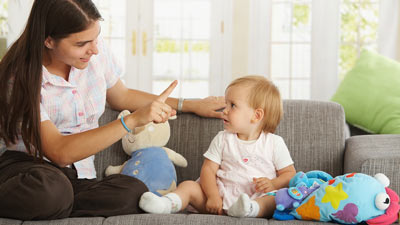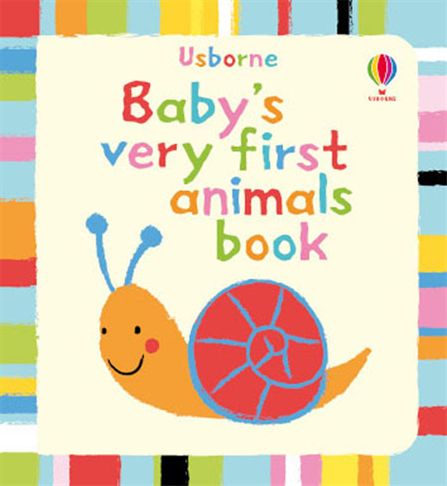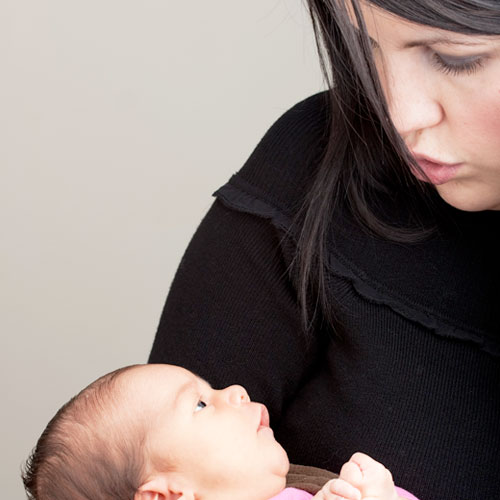When dropping my 2-year-old off at daycare the other day the educator asked her for a hug, then smiled and looked up at me. “Oh I’ve missed her,” she said, referring to the week before, which Miss 2 had off due to illness. “She and I have the best conversations”. I knew exactly what she meant, I laughed…
Now I don’t mean to brag, but Miss 2 and her older sister (4) both have pretty strong language skills, and I don’t mean they are just compulsive chatter boxes. I can say without a doubt, this is because hubby and I have talked to them, read with them and recited nursery rhymes since birth. You might already do all of these things but if you’re a mum-to-be, new mum or are simply interested in finding out more, have a little read of how and why you should talk to your baby.
How well you talk to your baby impacts upon their future success
Research has shown that babys’ and toddlers’ development of language and vocabulary are greatly influenced by how much, and more importantly, how well their parents talk to them. What’s more, the language skills that a child develops from birth impact upon the success that they will achieve at school and for the rest of their lives.
Should I still use baby talk?
Coochy coo, beddy bies, blankys and boo-boos. Baby talk is the high pitched, sing-song tone and shortening or simplifying of words that we use with babies. I have certainly done it with my babies and I’m sure you do it too. It’s natural and fun and there’s nothing wrong with a bit of baby talk – it captures your baby’s attention and encourages a conversational exchange that helps develop her communication skills.
But it’s not the only way that you should talk to your baby. It’s also extremely important that babies are exposed to rich, varied language and longer sentences.
7 tips for talking to baby
So what can you do to promote your baby’s language development? Here are a few simple tips for talking to your baby:
1. Talk to your newborn
Start talking to your baby as soon as they are born, even if you don’t receive much response. Baby’s brains take in and process more vital information than you might think. Your little one always loves listening to the sound of your voice (even if your partner doesn’t 😉 ).
2. Don’t dumb down your language
According Professor Erica Hoff, a psychologist at Florida Atlantic University, you shouldn’t “dumb down” your language when you are talking to your baby. “It’s not just how much speech you get, but the kind of speech you get,” she said. “’Speech needs to be rich and complex.” So instead of saying short phrases like, “Want this?” say “Would you like to play with this rattle?”
3. Make connections when you talk to your baby
Pointing at objects and giving them labels such as “car” “sky” and “moon” is less effective at teaching your baby language than connecting words and meanings by communicating in complex sentences such as “Daddy is driving our red car to work today.” or “The sun has gone to sleep now and the moon is up in the sky.”
“You’re building intelligence through language,” explains Stanford University psychology professor Anne Fernald “It’s making nets of meaning that then will help the child learn new words.”

4. Talk directly to your baby
Although your baby may absorb some of the conversations between you and other family members they gain the most benefit from speech directed at them. Have regular conversations with your baby even if it seems one-sided and make you feel a little silly. Talk about what you are doing, where you are going and what you can see. A young baby may respond with sounds and gestures and you should then respond to her. It is still important to imitate your baby’s vocalisations, facial expressions and gestures as this teaches her the give-and-take of conversation.
5. Turn off the TV
Watching TV does nothing for your baby’s brain development. All of that ‘talk’ is just background noise to your baby. Instead, turn it off and talk to your baby as you go about your day changing his nappy, getting him dressed and preparing his meals… “Would you like banana for breakfast? You like bananas don’t you? I do too. I’m going to peel it first. Then I’ll put it in a bowl and mash it up with a fork. Watch mummy mash. Mash, mash, mash, mash…”
6. Read to your baby from birth
I know, I know you’ve heard it before but it’s so important that it’s worth reiterating… reading to your baby every day is crucial to language development and yes even from birth. Books filled with rhyme and repetition are great for babies of all ages.
Babies from 4-12 months will be especially interested in books filled with lots of bright colour and different textures. Talk about the pictures, colours and textures as you go through the book. “Touch and feel books” are great as they encourage physical interaction and connection.
10 minutes of reading every day will boost your child’s brain power by building their listening, memory and vocabulary skills.

7. Recite rhymes with your baby
Reciting rhymes to your baby is another great tool for language development. Rhymes expose and reinforce the elements of pitch, volume, and voice inflection, as well as the rhythm of language. The repetition of rhymes will help your child to remember sounds and words and teaches them the relationship between words. Prof Anne Fernald explains that learning relationships between words, such as “the horse pulls the cart” allows young children to form an understanding of the world which sets them up for later success at school.
Have conversations, read books and recite rhymes with your baby every day to promote language development and build your baby’s intelligence. Simple hey?
If you’re like me and have trouble remembering the words to songs and rhymes, you might like to try my online activities complete with demonstration and lyrics. You’ll learn the words in no time!
Here’s a fun nursery rhyme (with actions), from Session 4 of my program, enjoy!
Roly Poly

What to Do
- Lie baby on the floor or sit him in front of you.
- Say the rhyme and do the actions, which are most suitable for your baby’s age/physical development.
Words and Actions
Roly poly roly poly out out out (Circle baby’s arms and move hands away from each other)
Roly poly roly poly in in in; (Circle arms and bring hands together)
Roly poly roly poly touch your nose (touch baby’s nose)
Roly poly roly poly touch your toes (pull baby to seated position and help him touch his toes) or (touch his toes)
Roly poly, roly poly up to the sky (lift baby into the air N.B if baby is under 6 months ensure head is supported)
Roly poly roly poly, fly, fly, fly (move baby around as if flying) or (place your arms under baby’s belly and gently fly him around)


0 Comments